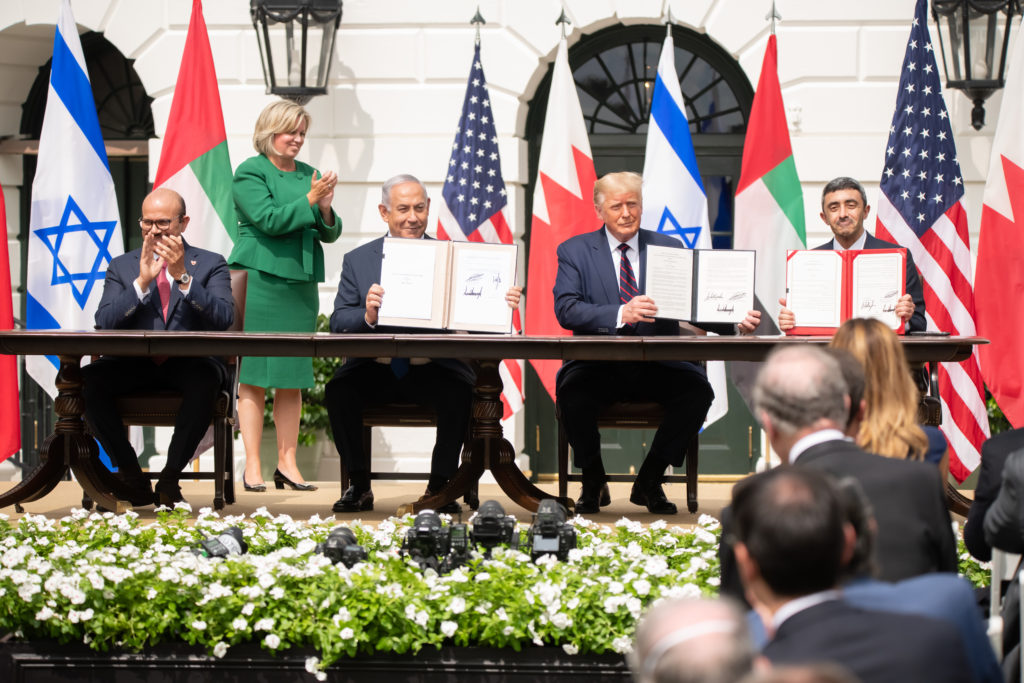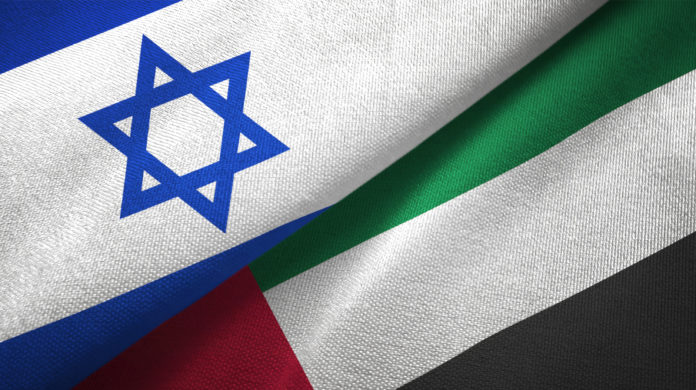Sabina Hashmy looks at the close and warm relationship between the UAE and Israel which has eclipsed any previous normalisation moves by Muslim nations and Tel Aviv.
It has been a little under two years since the Abraham Accords brokered by the U.S. were signed between the UAE, Bahrain and Israel. The agreements sought to make relations between the three countries both public and official, although it is well known that covert meetings, the sharing of intelligence, and surreptitious visits from Israeli state officials to the UAE all took place in the decades preceding the accords.
Nevertheless, the accords were a significant break in the established position of most Muslim majority states which have maintained no direct relations with Israel or have sought to keep them behind closed doors until a just peace is established in Palestine.
Since their inception the signatories have rapidly developed warm cultural and economic ties. A slew of major investments have followed and current bilateral trade is estimated to be in the region of $600m. A free trade agreement negotiated earlier this month will see this figure rise exponentially over the next few years.
“This milestone deal will build on the historic Abraham Accords and cement one of the world’s most important and promising emerging trading relationships,” United Arab Emirates Minister of State for Foreign Trade Thani Al Zeyoudi said on Twitter.
Reactions to normalisation
The signing of the accords provoked a variety of reactions from neighbouring states and other Muslim majority nations. Whilst some – particularly the Palestinians, Turkey and Iran – were vocal in their condemnation, others such as Egypt, Oman and Saudi Arabia signalled a tacit acceptance of the new status quo.
Subscribe to our newsletter and stay updated on the latest news and updates from around the Muslim world!
“This agreement does absolutely not serve the Palestinian cause, it rather serves the Zionist narrative. This agreement encourages the occupation [by Israel] to continue its denial of the rights of our Palestinian people, and even to continue its crimes against our people,” Hamas spokesman Hazem Qassem said.
“The Palestinian leadership rejects and denounces the UAE, Israeli and U.S. trilateral, surprising announcement,” said Nabil Abu Rudeineh, a senior adviser to Mahmoud Abbas.
“History and the conscience of the region’s peoples will not forget and never forgive this hypocritical behaviour of the UAE, betraying the Palestinian cause for the sake of its narrow interests,” a statement from Turkey read although Ankara would later roll out the red carpet for the Israeli president.
On the other hand, Egyptian President Abdelfatteh El-Sisi observed: “I followed with interest and appreciation the joint statement between the United States, United Arab Emirates and Israel to halt the Israeli annexation of Palestinian lands and taking steps to bring peace in the Middle East,”
Cold versus warm peace
The accords are a marked departure from previous peace treaties signed by Egypt and Jordan which both had a long history of active military conflicts with Israel. These treaties were intended to prevent future wars in return for the recognition of Israel as a nation state.

Editorial credit: noamgalai / Shutterstock.com
In doing so Egypt paid a heavy price politically – it was removed from the Arab League for a time and its president Anwar Sadat was assassinated in 1981. Jordan too signed the Wadi Araba agreement in 1994 to end further armed conflict and settle land and water disputes with Israel.
In both instances the agreements established a “cold peace” in which interactions were mainly limited to diplomatic relations, while citizens of both Egypt and Jordan remained resistant to forming any further ties to Israel.
In contrast the Abraham Accords cannot really be described as “peace agreements” as those involved have never been at war with each other. The agreement from the outset was intended to maximise economic development and to form a new “Middle East” bloc that is inclusive and fully accepting of Israel in exchange for trading opportunities.
The enemy of my enemy is my friend
The other driving force behind the agreements were security concerns shared by both Israel and the UAE over the growing influence of Iran in the region.
The need to contain Iran was the primary reason for the 2019 Warsaw conference jointly organised by Poland and the U.S. It brought together then Israeli Prime Minister Netanyahu with a host of foreign ministers from across the Arab world. The purpose was to promote the narrative of Iran as an ongoing threat to peace and stability in the region.
“You can’t achieve peace and stability in the Middle East without confronting Iran. It’s just not possible,” former U.S. Secretary of State Mike Pompeo said at the conference.
The UAE sold the signing of the trilateral agreement as a positive step in reviving the moribund two state solution and a means of limiting further colonisation of Palestinian land in the form of settlements.
But in practice the idea of the UAE using its leverage as a trading partner to influence Israel’s policies relating to the Palestinian people has not materialised. Instead, the Palestinians have continued to experience land seizure, repression and violence from Israel since the accords were signed with no signs of public intervention or diplomacy from the UAE.
So in a little under two years the relationship between the UAE and Israel has shifted geopolitical realities in the Middle East and continues to divide the global Muslim community.
Yet the deteriorating situation in Palestine has not dampened the intensity and speed of the development of relations between the UAE and Israel. The path of peace and prosperity offered by the accords looks to be one intended only to financially benefit the signatories.


















